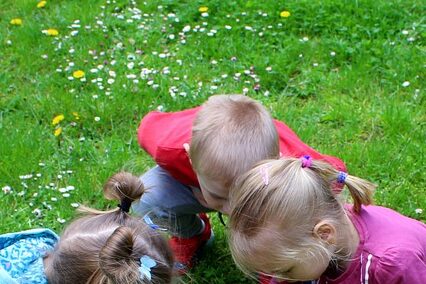It never occurred to you that you were holding a science genius when you first held your beautiful baby. Children’s innate love of science is all too evident from the moment they are born. Your scientist experimented with gravity as a toddler by pushing objects over the side of his highchair.
He became a researcher by cleaning out your cupboard to categorize its contents and became a crazed ornithologist by mimicking the surrounding birds’ merry tweeting. Your child can be a science genius when he or she reaches preschool age.
With these nine strategies to boost his science abilities, you can keep the excitement going and help your youngster achieve his goals.
Tips for Children Science Learning
Let them Fiddle Around
Children are willing to tinker with anything lying around and have a strong tendency to do so. Find out by asking for your headphones. To disassemble and rebuild things or find their counterparts, you name it, and kids can do it. So, let your kids fiddle around.
All you need to do is stand back and offer encouragement. And keep your amazement (or horror) to yourself while your youngster mixes those vase fillers with his play dough to create a perplexing object. Take pride when they call these weird creations as space robots and dinosaurs. These are baby steps to becoming an intelligent science student.
Give him Entry into your Kitchen
You have to spend time in the kitchen, after all. It’s all a thrilling science show for your child, who is mesmerized by the clanging pots, the alluring smells, and the unmatched sights. Your youngster will learn about chemical reactions in the kitchen as solids and aromas undergo long-lasting changes. It is one of the best answers to how to study Chemistry at home.
You can give your kid a front-row seat to the action by giving him a part in everything. He can learn about cause and effect by doing something as easy as cracking an egg or adding bouillon and seeing what happens. Everything children see and experience during their early childhood days is learning for them
Let them Explore!
Discover, discover, discover! Everything is a science on this planet. There are several opportunities to learn on a trip to the park or an afternoon spent in the backyard because science is present everywhere.
Always encourage your youngster to inquire about their environment before having a discussion. If there is anything about which you are uncertain, study and figure it out together. You don’t need to have all the answers; as a matter of fact, it helps to be curious about yourself as a parent.
Encourage Sensory Play
Every day presents new chances to learn about various weights, textures, and fragrances. This kind of interactive research strengthens the scientific method and offers your child practice with classification. Allow your child to examine the food. Get his assistance in sorting beans.
Give him the whisk, and instruct him to stir the cake batter. Defy him to remove the kink in your neck. It wouldn’t function. Every exercise will take him closer to science and support him in learning more about it.
Transferring and Pouring
Allowing your kid to pour and transfer various materials is a simple technique to aid him in understanding volume and gravity. For example, he can transfer cereal between bowls with a spoon. He can transfer water between tiny and large containers.
As enjoyable as taking pleasure in your children’s fit of giggles when they spill water, be careful to consider the practical applications of this talent. Allow your toddler to pour everyone’s orange juice one morning after you’ve had some practice pouring large amounts with plastic pitchers. This is one of the most important tips for children science Learning.
Let it go
Newton’s mother wasn’t there to interrogate him about the significance of the apple dropping on his head, right? As a parent, you must have an idea about a lot of things. And it is quite natural. But for our kids, even a tiny discovery can be path-breaking.
So, the idea is to sit back and see them explore independently. Let them go in their wildest imaginations and seek answers to several questions. This exercise can help immensely in his or her science learning.
Consider their Interests and Passions
Remember your child’s unique personality, hobbies, and social tendencies. It will enable you to think of interesting activities that thrill but also make them feel at ease. Also, consider your child’s interests because doing so will enhance their learning capacity. Finally, invest in a few tools if your youngster is interested in learning more.
For instance, a cheap microscope could visit your neighborhood pond on an educational afternoon. Have fun with science! Many enjoyable toys, such as ant farms, astronomy kits, and kitchen science activities, will engage kids.
Online Tutoring can Immensely Help
Enrolling your child in online summer tutoring programs can also help build a strong academic base. Expert tutors have a comprehensive blueprint or lesson plan to help children learn the nuances of this subject. They can also teach the art of recording observations.
Children can use such records to remember what they observed, heard, questioned, or learned. For instance, the moon, how the leaves change on the trees, or how a plant grows. Would you like to draw that? or “Do you want me to assist you in writing down what you noticed?” With such questions, tutors can encourage children to delve deeper into scientific concepts and logic.
Turn a Question on their Side
Children are curious by nature. They can come up with hundred questions on a single scientific statement. So, instead of giving them easy answers, experts recommend returning the query to your child. You should also not ignore his observation or make him believe you are completely ignorant.
Boost your researcher’s efforts. For example, asking him why he believes the sky is blue can improve his capacity to conduct research with the added advantage of teaching him how to hypothesize or make informed assumptions.
Bottom Line
As a parent, creating an environment of exploration, positiveness, and curiosity can help significantly strengthen your child’s science learning. Moreover, you can also seek assistance and guidance from his offline and online teachers. Together you can provide the right platform for your child. Hopefully, these tips for children science learning are useful for you.


